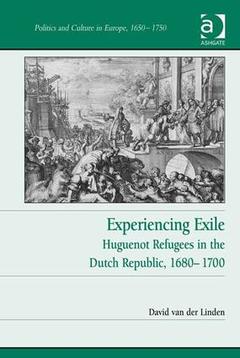Experiencing Exile Huguenot Refugees in the Dutch Republic, 1680–1700 Politics and Culture in Europe, 1650-1750 Series
Auteur : Linden David van der

Introduction. Part I The Economy of Exile: Leaving France; Making ends meet. Part II Faith in Exile: The comforts of preaching; Hearing the message; The end of exile. Part III Memories in Exile:Refugee memoirs; Writing the Huguenot past. Conclusion; Appendix; Bibliography; Index.
Date de parution : 03-2016
15.6x23.4 cm
Thèmes d’Experiencing Exile :
Mots-clés :
walloon; church; huguenot; refugees; refugee; ministers; nouveaux; convertis; dutch; republic; William III; Nouveaux Convertis; Livre Des Martyrs; Refugee Ministers; Myriam Yardeni; BPL; Walloon Churches; Teding Van Berkhout; Dumont De Bostaquet; TNA; Claude Brousson; Pierre Jurieu; Basnage De Beauval; Young Man; BGE; AAE; Huguenot Refugees; Le Faucheur; Huguenot Ministers; Walloon Synod; Huguenot Past; De Nantes; De Marillac; Protestant Worship; Anthonie Heinsius



